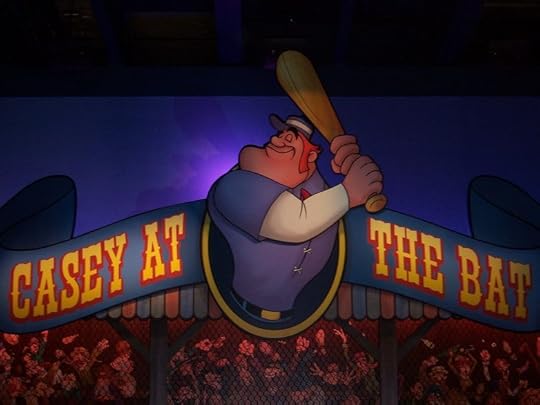Robin Helweg-Larsen's Blog, page 40
October 27, 2023
Using form: Edmund Conti, ‘A Clutch of Clerihews’

Barack Obama
Doesn’t do drama.
The play’s not the thing
Wherein he’ll catch the conscience of Larry King.
Hillary Clinton
Likes to have a mint on
Her hotel pillow
Whether she’s in Islamabad or Amarillo.
Joe Biden
Can never decide on
Which words to use to ready us for the long haul.
So he uses them all.
Sean Hannity
Doesn’t think sanity
Should be one of the necessary talents
For reporting the news with fairness and balance.
Sarah Palin
Drives another nail in
Her chances for success
when she answers a question with anything but ‘No’ or ‘Yes’.
*****
Edmund Conti writes: “The problem with Clerihews is that when you start you can’t stop writing them. I don’t think Edmund Clerihew Bentley had any strict rules for them, except finding the fitting rhyme for the principal’s name. I was fortunate at that time to find five notable persons with easy rhymable names. Anyway, we Edmunds have to stick together.”
Edmund Conti has recent poems published in Light, Lighten-Up Online, The Lyric, The Asses of Parnassus, newversenews, Verse-Virtual and Open Arts Forum. His book of poems, Just So You Know, released by Kelsay Books
https://www.amazon.com/Just-You-Know-Edmund-Conti/dp/1947465899/
was followed by That Shakespeherian Rag, also from Kelsay
https://kelsaybooks.com/products/that-shakespeherian-rag
Photo detail of: “Holder, Napolitano, Baker, Biden, Obama, Clinton, Jones, Rice” by scriptingnews is licensed under CC BY-SA 2.0.
October 25, 2023
Poem: RHL, ‘On Doing Nothing’

Here where the royal poinciana’s blaze
pales to haze in the full midday craze
of light on shallows stiller than you can see
and all time stops, worn out from timeless sun
in a land and season where nothing’s to be done,
futility stretching to eternity,
and nothing is, except for heat and light…
accept the heat and light, the dazzling green and blue,
do nothing: for there’s nothing here to do.
Although elsewhere the world’s a ruin of smoke—
democracy and leadership a joke—
I unapologetically sit out the war
(whether on virus, climate change, or rich v. poor),
I’m Swede or Swiss to their corrupted plight.
A fish, a coconut—I don’t need more.
And so I sit and think, and read, and write.
*****
I should probably write a little about this poem’s form (iambic pentameter and rhyme, and could have had more shape if I had put more effort into it) or inspiration or whatever… but that would be work, and who needs that?
Published this month along with two others in Shot Glass Journal, anyway… thanks, Mary-Jane Grandinetti!
Photo: “Lazy Afternoon” by cybertoad is licensed under CC BY-NC-ND 2.0.
October 23, 2023
Using form: John Beaton, ‘Stillbirth’

I.
The day I left for Canada my mother
and father quelled their tears. We held and hugged.
He said, “We three may never see each other
alive again.” That leaving
hooked my gut and tugged.
We never did. He died and left her widowed
so next time we three met was at his tomb.
Our parting afterwards had been foreshadowed–
the breakage of the cord
that fed me from her womb.
We rode on gondolas to summits she
had never dreamed of. Mountains could not buy
her heart from where they’d raised the family–
we shared reunions linked
by contrails in the sky.
II.
Hi, Mum. It’s me, from Canada, your John.
Och, John! You’ve caught me in an awful state!
I know. I’m sad to hear that Henry’s gone.
The one that was my brother?
My memory’s not great.
He’s back now, from the War. Oh dear, they’re here.
Who? They’re all against me. Who? The clique.
They’ve done such nasty things. They think I’m queer.
I think I’ll kill myself.
So how’s the house this week?
Och this one’s grand. I moved two days ago.
And Johnny helped. I think he’s at the door.
I’ll have to run now, Henry. Cheerio.
Don’t go. The phone is dead.
The cord exists no more.
III.
A winter storm comes sweeping down the hills
and, gusting, blasts umbrellas inside-out.
They ring the grave like blighted daffodils
and rain-black mourners hold,
like buffeted peat-burn trout.
I take the tasselled pall rope, let it slide,
and with my brothers ease the coffin down;
it slips across the lip of a great divide
and sinks what was my mother–
a shuck, a wrinkled gown.
Gales carry off the prayer as it is spoken.
I cast the rope adrift. the rains of Skye
slap my back. Again, a cord has broken–
I try but cannot cry.
*****
John Beaton writes: ” This one is autobiographical. Using the metaphor of an umbilical cord, it tells how emigration stretches and breaks family connections. The title refers to the old practice alluded to in the last stanza of holding the newborn upside down and slapping it on the back till a cry indicates its lungs have started to work and it is breathing on its own. At the end of the poem grief, prevents such a cry.
The dementia dialog is taken pretty much verbatim from an international phone call to my mother. That’s the part that crystallized the abaca rhyme scheme and 55533 meter. The dialog fell into place with that pattern and I felt it worked for the rest of the poem too. I think the last two lines of each stanza, with the first being unrhymed and the second linking through masculine rhyme with line two, act like an alexandrine and combine to give a closure effect.
The three-part structure represents three stages of escalating disconnection.”
John Beaton’s metrical poetry has been widely published and has won numerous awards. He recites from memory as a spoken word performer and is author of Leaving Camustianavaig published by Word Galaxy Press, which includes this poem. Raised in the Scottish Highlands, John lives in Qualicum Beach on Vancouver Island.
https://www.john-beaton.com/
“Cill Chriosd Graveyard Isle of Skye Scotland” by Tour Scotland Photographs is licensed under CC BY-NC-ND 2.0.
October 20, 2023
Short poem: Peggy Landsman, ‘Speech Impediment’

My every breath
An inspiration—
Breathlessness
My deathtination.
*****
Peggy Landsman writes: “About ‘Speech Impediment’: Need I say more?”
Peggy Landsman is the author of the full-length poetry collection, Too Much World, Not Enough Chocolate (Nightingale & Sparrow Press, 2023), and two poetry chapbooks, Our Words, Our Worlds (Kelsay Books, 2021) and To-wit To-woo (Foothills Publishing, 2008). She lives in South Florida where she swims in the warm Atlantic Ocean every chance she gets. ‘Speech Impediment’ was originally published in The Lyric, and a selection of her poems and prose pieces can be read on her website: https://peggylandsman.wordpress.com/
“Breathless” by eeblet is licensed under CC BY-NC-ND 2.0.
October 18, 2023
Non-traditional sonnet: RHL, ‘The Range of Change’

In times of no change, the advantage lies
with those who are receptive to being taught.
Parents and teachers may seem truly wise,
avoiding dangers with which life is fraught;
the stories of the old none would despise
when they hold all the answers that are sought.
In times of constant change, advantage shifts
to those who, hating school, go and explore.
Old answers fail. Fresh questions cause great rifts
with parents who are seen as wise no more;
questions now turn up unexpected gifts
in crossing unknown seas to virgin shores.
Remain alert that there’s a range of change
from none, to gradual, to fast, to strange.
*****
A sonnet, or not? 14 lines of iambic pentameter, rhyming regularly and with a final couplet. Though not in either of the standard English forms, it has the organised, compressed, reflective sense of the sonnet. Recently published in Shot Glass Journal, Online Journal of Short Poetry. Thanks, Mary-Jane Grandinetti!
“Climate change icon” by Tommaso.sansone91 is marked with CC0 1.0.
October 16, 2023
Odd poem: Muhammad Ali, ‘Me, We’

Me?
We.
*****
Muhammad Ali was invited to talk to a group of Harvard students on June 4, 1975. Someone shouted, ‘Give us a poem, Muhammad’ and he paused, looked up and said: ‘Me? We’. But as it was spontaneous and spoken, the punctuation is what you will, and evokes a variety of ideas and responses. Questions of identity… of Ali himself being part of the roomful of attendees… of the needs of the group outweighing the needs of the individual… the human journey from selfishness to altruism… Certainly all that is in keeping with the speech he gave that night, excerpted here.
It claims title to the World Championship for the shortest poem, at least in the English language.
October 13, 2023
Using form: biform poem: Daniel Galef, ‘Casey to his Bat’

(as a sonnet after Eugene Lee-Hamilton’s 1888 collection “Imaginary Sonnets”)
You’re swell! No wizard’s-wand or Rod of Aaron
With this ease can whack one past the glove
The way a sparrow weaves through trees. No baron
Wields your power—you’re the scepter of
A king, and blood descendent of the club
That Hercules did swing. That bat was blessed!
It knocked the blocks off lions. (Not a cub—
A full-grown beast.) Herc wore its skin, the rest
Cooked up for grub. My point: We’ll stand immobile.
It’s beneath us—just a dud. To swing
At these poor lulus would insult your noble
Blood. One pitch will come—the air will sing—
We’ll know that this is it. We’ll swing. We’ll hit!
The crowd will cheer! We’ll run! We’ll win!—Oh, shit.
~ ~ ~ ~ ~ ~ ~ ~ ~ ~ ~ ~ ~ ~ ~ ~ ~ ~ ~ ~ ~ ~ ~ ~ ~ ~ ~ ~ ~ ~ ~ ~
(in the meter of Ernest Thayer’s 1888 poem “Casey at the Bat”)
You’re swell! No wizard’s-wand or Rod of Aaron with this ease
Can whack one past the glove the way a sparrow weaves through trees.
No baron wields your power—you’re the scepter of a king,
And blood descendent of the club that Hercules did swing.
That bat was blessed! It knocked the blocks off lions. (Not a cub—
A full-grown beast.) Herc wore its skin, the rest cooked up for grub.
My point: We’ll stand immobile. It’s beneath us—just a dud.
To swing at these poor lulus would insult your noble blood.
One pitch will come—the air will sing—we’ll know that this is it.
We’ll swing. We’ll hit! The crowd will cheer! We’ll run! We’ll win!—Oh, shit.
*****
Daniel Galef writes: “I wrote this poem in 2017 while I was a student at McGill University and looking for anything to work on except my work. I have always loved both math and language, as well as making them kiss like two Barbies you mash together, and “Casey” was inspired by a couple of happy arithmetical coincidences: First, that there are exactly 70 metrical feet (or 25.52 imperial metres) in either one sonnet or 20 lines of ballad meter. Second, that both Ernest Thayer’s famous ballad “Casey at the Bat” and Eugene Lee-Hamilton’s not-so-famous collection Imaginary Sonnets were published in 1888.
The speaker of “Casey” is the mighty mock-hero of Ernest Thayer’s poem, subtitled a “Ballad of the Republic,” which is composed of standard ballad meter: rhyming couplets in iambic heptameter or alternating lines of tetrameter and trimeter. Thayer’s was possibly the last American poem to have massive popular appeal to the extent that it was commonly memorized for fun, performed on the vaudeville stage, and adapted into multiple films and even Disney cartoons. I memorized it in college as a party trick, which I’m quite eager to try out if I ever get invited to any parties.
As far as I know, this is the first sonnet* of its kind. I wrote another after, which was published first. Now that my first book is out,** I’ve written a third and fourth, but am still in the process of trying to find them loving homes in some journal or website where they can frolic and play with the other little sonnets. Of course, nothing’s wholly original. When I was a child I read a short poem by Mary Youngquist in a Willard Espy book which was readable as eight lines of six syllables or six lines of eight syllables. Robin informed me when the second of these was first printed (“A Poke of Gold” in Snakeskin Poetry in 2019; “Casey” was published in Able Muse in 2020) that the French surrealist Louis Aragon was toying with similar four-six/six-four patterns in the 1940s. But I think these are the first sonnets!
If you liked these, by all means check out my book, Imaginary Sonnets, available wherever sonnets are sold—but try here first: danielgalef.com/book/
*Sometimes they’re sonnets! I don’t really know what to call these. “Convertible sonnets” makes it sound like the rain will get in if you leave the top down, and “transforming sonnets” are plastic toys that come with a kid’s meal. The inaugural issue of the Journal of Wordplay called it an “equivocal sonnet,” and linked it to the 19th century genre “equivoque.” If you alternate the letters of sonnet and ballad, you get “sboanlnleatd.”*** Or, if you change the lineation of the poem only on a full moon: “were-sonnets”?
**Imaginary Sonnets (Able Muse Press, 2023), inspired by the Lee-Hamilton book—70 persona poems all from the point of view of different historical figures, literary characters, and inanimate objects, including Lucrezia Borgia, Wernher von Braun, and a new brand of breakfast taco.
***Both “sonnet” and “ballad” come from the Old Occitan troubadours; “sonnet” is a diminutive of “song” whereas “ballad,” a cognate with “ballet,” comes from “dance.”
*****
Daniel Galef’s first book, Imaginary Sonnets, is a collection of persona poems all from the point of view of different historical figures and objects, including Nossis the Epizephyrian, Christopher Smart’s cat, and a breakfast taco. Besides poetry, he has written plays that won the McGill University Drama Festival, flash fiction selected for the Best Small Fictions anthology, and last year he placed second in the New Yorker cartoon caption contest, which doesn’t really mean anything but he’s been telling everyone anyway.
Photo: “Casey At The Bat at Games On The Boardwalk” by Castles, Capes & Clones is licensed under CC BY-ND 2.0.
October 11, 2023
Sonnet: ‘Sad, Actually’

Unreconstructed, with unhealthy heft—
the image of uncivilised great ape—
a fraud who tries to win by lies and theft,
a man who’d propagate by power and rape,
racist extoller of his genes alone,
a would-be genocidal patriarch,
successful in some twilight Darwin zone,
uncultured as a mugger in the park…
But note, behind the thin success veneer,
the shallow love of gold and gilt and glitz,
gloating dismissals and the bloated sneer,
the self-aggrandisement that never quits:
an unloved child’s in some deep down recess,
the secret of the man’s unhappiness.
*****
I can’t help feeling sorry for people who were raised so badly that they have never learnt to find security, inner peace, personal meaning. On the other hand I can’t help rejoicing when some destructive, selfish racist is exposed as a cheat and a fraud under the control of a foreign power, and is removed from positions of authority. I think of that sympathy/schadenfreud dichotomy as a healthily balanced contradiction; but then, I’m a Libra…
This sonnet (Shakespearean, being in iambic pentameter and rhyming ABAB CDCD EFEF GG) has just been published in Shot Glass Journal, an online journal of short poetry. Most of what they publish is not formal verse, but most of mine is.
Photo: “File:Vladimir Putin and Donald Trump (2019-06-28) 06.jpg” by Presidential Press and Information Office is licensed under CC BY 4.0.
October 9, 2023
Using form: irregular sonnet: Jane Blanchard, ‘Premises’

After an argument I listen hard
to noises in our common house—the ticking
of clocks, the humming of fans, the creaking of floors,
the rumbling of pipes, the ringing of phones, the groaning
of springs, the clacking or clinking of keys, the droning
of television, the drumming of laundry, the clicking
of locks, the tumbling of ice, the squeaking of doors—
all louder once a morning has been marred.
Hours may pass as I interpret sound
by sound—source, frequency, duration. Some
attention goes to silences, which pound
and pound, but not to show where each comes from.
Throughout, peace can be found in knowing you
are also wondering when words are due.
*****
Jane Blanchard writes: “This sonnet from Metes and Bounds was first published in Mezzo Cammin (Summer 2017). It is rather irregular, especially in the octave, but such deviation seems appropriate for the subject, at least to me. This poem is largely a list, yet it has narrative and lyrical elements, too, and the experience described, I hope, is easily perceived.”
A native Virginian, Jane Blanchard lives and writes in Georgia. Her latest collection with Kelsay Books is Metes and Bounds (2023).
Photo: detail of the cover of Metes and Bounds.
October 6, 2023
Using form: Accentual Metre: Susan McLean, ‘Stone’

Offered bread,
I asked for a stone.
The stone was good,
but I ate alone.
I took my bows
in a hail of rocks,
and built my house
of stumbling blocks.
But its walls are aligned
so true and tight
that they keep out the wind
that blows all night.
*****
Susan McLean writes: “And when the tempter came to him, he said, If thou be the Son of God, command that these stones be made bread.” Matthew 4:3 (King James Version)
“Or what man is there of you, whom if his son ask bread, will he give him a stone?” Matthew 7:9 (King James Version)
“I am not a religious believer, nor have I been one for many decades. But the poetry of the Old Testament and the metaphorical language of the New Testament both left their mark on me. Paradoxes and counterintuitive arguments, so integral to parables, are also at the core of poetry. Bread and stones—what does it mean to refuse the former in favor of the latter? To reject the normal and necessary, while choosing the impossible and unsustaining, can only lead to being misunderstood and rejected oneself, possibly even persecuted. Yet in this poem I argue that, paradoxically, taking the hard and lonely path has its own rewards. A stumbling block is solid; with a sufficient number of them, one can build a shelter that can withstand the strongest winds.
“The slant rhymes in lines 1 and 3 of each stanza, with their hint of dissonance, meet the resolution of the true rhymes in lines 2 and 4. Because dimeter lines, with just two stresses per line, can quickly become monotonous if the lines are too regular, I chose to use accentual meter instead of the more predictable accentual-syllabic meter. Therefore, the number of syllables per line varies from a low of three to a high of six. “This poem, originally published in the online journal The Chimaera, later appeared in my second poetry book, The Whetstone Misses the Knife.”
Susan McLean has two books of poetry, The Best Disguise and The Whetstone Misses the Knife, and one book of translations of Martial, Selected Epigrams. Her poems have appeared in Light, Lighten Up Online, Measure, Able Muse, and elsewhere. She lives in Iowa City, Iowa.
https://www.pw.org/content/susan_mclean
Photo: “Beautiful circular window and rough stone wall on this quaint little former school house in Arklow from the 1800s #windows #arklow #irisharchitecture” by irishhomemagazine is licensed under CC BY-SA 2.0.



